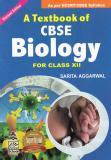Welcome to the Advanced Biology course for Class 12, designed to provide a comprehensive understanding of advanced biological concepts and principles. This course is aligned with the CBSE curriculum and aims to foster analytical thinking, experimental skills, and a deeper understanding of biology at an advanced level.
Course Objectives:
- To build upon the foundational knowledge gained in Class 11 Biology.
- To explore advanced topics in genetics, molecular biology, and biotechnology.
- To understand the intricacies of human physiology and its interplay with various body systems.
- To study the processes of reproduction and development in plants and animals.
- To examine the principles of ecology, population dynamics, and environmental sustainability.
- To develop critical thinking and problem-solving skills through analysis of biological data and experimental design.
- To prepare students for competitive exams and future academic pursuits in the field of biology.
Course Outline:
Unit 1: Reproduction
- Sexual reproduction in flowering plants
- Human reproduction: Male and female reproductive systems, gametogenesis, fertilization, and embryonic development
- Reproductive health and human population growth
Unit 2: Genetics and Evolution
- Molecular basis of inheritance: DNA replication, transcription, translation, and gene expression
- Genetic basis of variation and inheritance patterns
- Evolution: Evidence, theories, and mechanisms
Unit 3: Biology and Human Welfare
- Strategies for enhancing food production: Plant breeding, animal husbandry, and tissue culture
- Microbes in human welfare: Microbes in household products, industrial applications, and sewage treatment
- Human health and diseases: Causes, prevention, and control measures
Unit 4: Biotechnology and its Applications
- Recombinant DNA technology: Tools and techniques
- Applications of biotechnology in medicine, agriculture, and environmental conservation
- Ethical issues and concerns in biotechnology
Unit 5: Ecology and Environment
- Ecosystem structure and function: Energy flow, nutrient cycling, and ecological succession
- Biodiversity and its conservation: Hotspots, endangered species, and conservation strategies
- Environmental issues: Pollution, global warming, ozone depletion, and sustainable development
Unit 6: Organisms and Populations
- Organisms and their environment: Habitat, niche, and adaptations
- Population attributes and dynamics: Growth, regulation, and interactions
- Ecosystem services and their significance
Unit 7: Cell Structure and Function
- Cell cycle and cell division: Mitosis, meiosis, and their regulation
- Cell signaling and communication
- Cell differentiation and stem cells
Unit 8: Human Physiology
- Digestion and absorption
- Breathing and exchange of gases
- Transport in plants and animals
- Excretion and osmoregulation
- Neural control and coordination
- Chemical coordination and endocrine system
Assessment Methods:
- Regular class assessments (quizzes, assignments, and worksheets)
- Periodic tests and examinations
- Practical laboratory work and experiments
- Investigatory projects
- Analysis of biological data and case studies
By the end of this course, students will have acquired a deep understanding of advanced biological concepts and their practical applications. They will be well-prepared for their CBSE Class 12 Biology examinations and equipped with the necessary knowledge and skills to pursue higher education in the field of biology. Additionally, this course will nurture scientific inquiry, critical thinking, and a sense of environmental responsibility among students.








